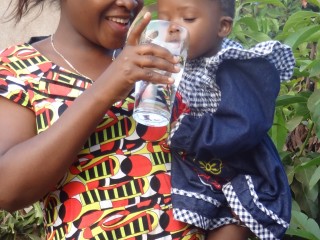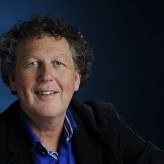Project Results:
The majority of Ghanaians do not treat the water at point of use as they perceive the water to be safe. There is a strong need for household water treatment and safe water storage (HWTS), such as filtration, chlorination and boiling. Awareness for safe water has been increased by the rise of the use of sachet water, but the plastic waste is enormous. Basic Water Needs sought to help lower income families get control over their own drinking water. Women leaders, sales ambassadors and women entrepreneurs were trained and subsequently demonstrated the filters to their network, such as existing women groups, community groups and church groups. Families could try the filter for 1-4 months, depending on the implementing partner. The idea was that people could try the filter for free and in that period save costs by not having to buy sachet water or to boil water. After the trial period each family could decide to buy the filter or to give it back.
The project wanted to prove if this new business model (try and buy) could develop a sustainable supply chain for household water filters. In practice, people were motivated to pay a deposit when taking the filter home and pay back in instalments during the trial period, because ‘it turned out in the beginning of the project that Try’ in Ghana is not seen as positive: it means that you are not sure about the quality of your product, nobody wants to try a filter which already has been tried by another family (as is being done with solar lights on which this approach has been based) and also treating people as a test or trial person was seen as negative. It therefore seems better to call the project ‘demo and buy’.
The pilot as such was quite successful, leading to both demand creation and income generation, and showing a large potential to scale up. As the project was carried out by three experienced local organizations in Ghana and one in the Netherlands, a lot of knowledge was gained and shared. This brought in additional knowledge to the previous work of Basic Water Needs supported by Aqua for All.
Key results
- 600 filters sold in 6 months via Try and Buy, plus an additional 250 filters pre-financed
- Customers were very satisfied with their filters and would recommend it to others
- Improvement of health for parents and their children, especially in the North of Ghana
- 850 families learned about waterborne diseases and their prevention
Tips for the future
- Important for demonstration and trust of filter
- Many families don’t want to reuse a filter that other families have already used
Potential for growth
Basic Water Needs identified certain steps required for scaling. These include establishing a stable organization in Ghana, setting up all aspects of a supply chain, importing new filters in order to keep the momentum going, creating a viable business plan and invest in marketing, branding and awareness.
Project partners
Basic Water Needs, Aqua for All
Period
1 December 2017 - 25 May 2018
Location
Accra, GhanaTamale, Ghana
Walewale, Ghana
Last project updates
Background
Although 89% of people in Ghana have access to improved water sources, 93% of them do not treat the water at point of use as they perceive the water to be safe. The Environmental Health and Sanitation Directorate acknowledged the need for household water treatment and safe water storage (HWTS), such as filtration, chlorination and boiling, A national strategy and scale-up model was drafted in 2014, together with UNICEF. This scale-up model consists of the following steps: (1) behaviour-first approach, (2) public-private partnerships and (3) commercial / business approach. The new installed government also gives high priority to improved drinking water.
Initial market research by Basic Water Needs in Ghana has shown that the supply chain of and awareness for HWTS is still very much undeveloped. Options in the market are chlorine tablets, but people do not seem to use them extensively, and there are locally made ceramic pot filters, Awareness for safe water has been increased by the rise of the use of sachet water. 500 ml sachets can be obtained everywhere in both cities and smaller towns. They are perceived to give safe ‘pure’ water but this is only guaranteed for some brands, and the plastic waste is enormous. The positive side of the sachet is, next to awareness for safe drinking water, employment for many people, especially women.
Market research by the Ghanaian partners in this project showed that people were positive towards using a water filter instead of sachets, for reasons of savings in the longer term, reliability (they can be sure that the water is safe) and decrease of plastic waste. Also the recent evaluation of iDE Ghana indicated that families are interested in and willing to pay for a water filter.
Some challenges to implement household water filters in Ghana are the relatively high initial investment costs, the absence of a supply chain, the unfamiliarity of filters and the ‘convenience’ of the sachets.
Project Plan
The project will consist of the following outputs and activities:
1. Promotion and product materials adapted to Ghana market
2. Initial stock of 600 Tulip Table Top filters and spare available in-country and distributed among partners
3. Coordinators and women group leaders trained in marketing and sales of the water filters, including awareness raising.
4. Product tried by 600 households by means of Try and Buy concept (social marketing, awareness raising, trial period, mid-term visit, monitoring)
5. Project evaluated
Target group
We will start with those groups where families now buy bottled water or water sachets, or boil the water.
Target group will most likely be middle to lower income areas. These will be areas where people do not have high end water purifying solutions to their disposal, but enough income to buy bottled water or water sachets.
Sustainability
Direct impact from the project: 600 households, average of 3000 people, will have increased or more affordable access to safe drinking water. Three coordinators and around 20 women leaders have been trained in technical and commercial aspects of water filters. Three new distribution points for water filters have been set up.
(Part-time) employment has been created for three coordinators, and around 20 women leaders have earned an income and will get the opportunity to set up a small business.
We have learned if this business model is successful to get safe water to people and also in which environment / with which approach it is most successful.
Because of continuing the project from one women group to the next, the expected spin-off will be that one year after the project ends, at least 2400 households have benefitted from the project. After the project, a small local supply chain has been set up in all three project areas. With the trained women, the sales is expected to increase organically without further need for funding.
Overview of Goals
Overal goal: sustainable access to safe drinking water for lower to middle income families in Ghana.
Project goals:
- Increased knowledge on water filters among the target group (medium and lower income households in three different urban areas in North and South Ghana)
- Product tried by 600 households through the Try and Buy concept with expectation that 80% will buy the filter and thereby gain long-term access to safe drinking water.
- Increased knowledge on marketing strategies of HWTS in Ghana
- Coordinators of three organisations and 20 women leaders trained in marketing and sales of Tulip Table Top water filters and can earn an income with the sales of water filters.

